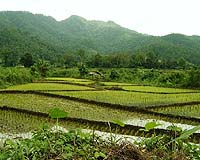 |
Vancouver, Canada (SPX) Jan 26, 2010 As agricultural land becomes increasingly valuable, the need to maximize its utilization increases and decisions about what crops to plant and where, become paramount. The sunflower family includes a number of valuable food crops, with sunflower seed production alone valued at about $14 billion annually. Yet the sunflower family is the only one of a handful of economically important plant families where a reference genome is not available to enable the breeding of crops better suited to their growing environment or consumers tastes. A new research project, largely funded by Genome Canada, Genome BC, the US Departments of Energy and Agriculture, and France's INRA (National Institute for Agricultural Research), will create a reference genome for the sunflower family - currently the world's largest plant family, containing 24,000 species of plants, including many crops, medicinal plants, horticulture plants and noxious weeds. The US$10.5 million research project titled, Genomics of Sunflower, will use next-generation genotyping and sequencing technologies to sequence, assemble and annotate the sunflower genome and to locate the genes that are responsible for agriculturally important traits such as seed-oil content, flowering, seed-dormancy, and wood producing-capacity. "The intent is to have the basis for a breeding program within four years," says project leader, Dr. Loren Rieseberg (University of British Columbia). One of the potential applications of this research includes a hybrid variety of sunflower, grown as a dual-use crop. The wild Silverleaf species of sunflower, known for its tall, woody stalks that grow 10 to 15 feet tall and up to 4 inches in diameter in a single season, could be crossbred with the commercially valuable sunflower plant that produces high quality seeds, capitalizing on the desirable traits of both species. "The seeds would be harvested for food and oil, while the stalks would be utilized for wood or converted to ethanol. As a dual-use crop it wouldn't be in competition with food crops for land," says project leader, Dr. Loren Rieseberg (University of British Columbia). In addition, this fast growing annual crop will be highly drought resistant, thanks to desirable traits from the Silverleaf variety, and would therefore be suitable for use in subsistence agriculture in places like Sub-Saharan Africa, as well as in much of North America. Dr. Nolan Kane (University of British Columbia) is one of the co-investigators on the project and together with colleagues at INRA in France, is doing much of the bioinformatics for the genome project. "The sunflower genome is 3.5 billion letters long - slightly larger than the human genome. The sunflower family is the largest plant family on earth - encompassing several important crops and weeds. Mapping its genome will create a very useful reference template for the entire plant family, which will enable us to work on closely related species," says Kane. Dr. Steve Knapp (University of Georgia) is another co-investigator on the project, whose work includes genetic mapping for desirable traits such as wood formation, as well as the development of germplasm for breeding. "The complete sequence will give us a full draft of the genome and eliminate the arduous one at a time process that we have been using up until this point," he says. "Genome BC is very pleased to support this innovative project, which will capitalize on Canada's strong genomics infrastructure and leadership in Sunflower genomics, in collaboration with other experts worldwide," says Dr. Alan Winter, President and CEO of Genome BC. "The potential applications of this research are extremely important, both globally and locally."
Related Links Genome BC Farming Today - Suppliers and Technology
 Thai poachers turn funghi farmers in bid to save forests
Thai poachers turn funghi farmers in bid to save forestsKhao Yai, Thailand (AFP) Jan 22, 2010 Nuan Muangchan began to illegally log rosewood as a teenager, creeping at night into Thailand's largest national park and hiding from animals and rangers to smuggle out her loot. "One time I jumped off a cliff to escape the authorities," the 43-year-old recalled, rolling up her sleeve to display her marked limbs. "I still have the scars on my arms and legs." Thailand's lush jungles are u ... read more |
|
| The content herein, unless otherwise known to be public domain, are Copyright 1995-2009 - SpaceDaily. AFP and UPI Wire Stories are copyright Agence France-Presse and United Press International. ESA Portal Reports are copyright European Space Agency. All NASA sourced material is public domain. Additional copyrights may apply in whole or part to other bona fide parties. Advertising does not imply endorsement,agreement or approval of any opinions, statements or information provided by SpaceDaily on any Web page published or hosted by SpaceDaily. Privacy Statement |